Related Research Articles

Super Bowl XXV was an American football game between the American Football Conference (AFC) champion Buffalo Bills and the National Football Conference (NFC) champion New York Giants to decide the National Football League (NFL) champion for the 1990 season. The Giants defeated the Bills by the score of 20–19, winning their second Super Bowl.

Super Bowl XXVI was an American football game between the National Football Conference (NFC) champion Washington Redskins and the American Football Conference (AFC) champion Buffalo Bills to decide the National Football League (NFL) champion for the 1991 season. The Redskins defeated the Bills by a score of 37–24, becoming the fourth team after the Pittsburgh Steelers, the now Las Vegas Raiders and the San Francisco 49ers to win three Super Bowls. The Bills became the third team, after the Minnesota Vikings and the Denver Broncos to lose back-to-back Super Bowls. The game was played on January 26, 1992, at the Hubert H. Humphrey Metrodome in Minneapolis, Minnesota, the first time the city played host to a Super Bowl.

Super Bowl XXVII was an American football game between the American Football Conference (AFC) champion Buffalo Bills and the National Football Conference (NFC) champion Dallas Cowboys to decide the National Football League (NFL) champion for the 1992 season. The Cowboys defeated the Bills by the score of 52–17, winning their third Super Bowl in team history, and their first one in 15 years. This game is tied with Super Bowl XXXVII as the fourth-highest scoring Super Bowl with 69 combined points, as of 2023. The Bills became the first team to lose three consecutive Super Bowls, and just the second of three teams to play in three straight. The following 1993 season, the Bills became the only team to both play and lose four consecutive Super Bowls. The game was played on January 31, 1993, at the Rose Bowl in Pasadena, California, and is the last NFL championship game to date to be held in a non-NFL stadium. It was also the seventh Super Bowl held in the Greater Los Angeles Area, which did not host another until Super Bowl LVI in 2022.
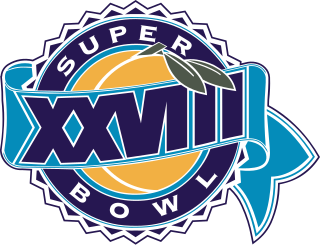
Super Bowl XXVIII was an American football game between the National Football Conference (NFC) champion Dallas Cowboys and the American Football Conference (AFC) champion Buffalo Bills to decide the National Football League (NFL) champion for the 1993 season. The Cowboys defeated the Bills, for the second straight year, by a score of 30–13, winning their fourth Super Bowl in team history, tying the Pittsburgh Steelers and the San Francisco 49ers for most Super Bowl wins. The Buffalo Bills became the only team to both play and lose four consecutive Super Bowls for a 0-4 franchise Super Bowl record, and as of 2023, remains the team's most recent Super Bowl appearance. The game was played on January 30, 1994, at the Georgia Dome in Atlanta. Since the 1993 regular season was conducted over 18 weeks, the traditional bye week between the conference championship games and the Super Bowl was not employed; the last time this had happened was before Super Bowl XXV.
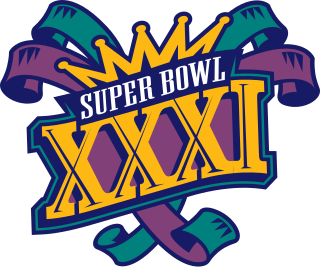
Super Bowl XXXI was an American football game between the American Football Conference (AFC) champion New England Patriots and the National Football Conference (NFC) champion Green Bay Packers to decide the National Football League (NFL) champion for the 1996 season. The Packers defeated the Patriots by the score of 35–21, earning their third overall Super Bowl victory, and their first since Super Bowl II. The Packers also extended their league record for the most overall NFL championships to 12. It was also the last in a run of 13 straight Super Bowl victories by the NFC over the AFC. The game was played on January 26, 1997, at the Louisiana Superdome in New Orleans, Louisiana.
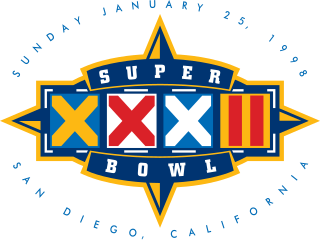
Super Bowl XXXII was an American football game played between the National Football Conference (NFC) champion and defending Super Bowl XXXI champion Green Bay Packers and the American Football Conference (AFC) champion Denver Broncos to decide the National Football League (NFL) champion for the 1997 season. The Broncos defeated the Packers by the score of 31–24. The game was played on January 25, 1998, at Qualcomm Stadium in San Diego, California, the second time that the Super Bowl was held in that city. Super Bowl XXXII also made Qualcomm Stadium the only stadium in history to host both the Super Bowl and the World Series in the same year.

Thurman Lee Thomas is an American former football running back who played in the National Football League (NFL) for 13 seasons, primarily with the Buffalo Bills. He played college football for the Oklahoma State Cowboys. Thomas was selected by the Bills in the second round of the 1988 NFL draft, where he spent all but one season of his professional career. He spent his final NFL year as a member of the Miami Dolphins in 2000.

Antowain Drurell Smith is an American former professional football player who was a running back for nine seasons in the National Football League (NFL), most notably with the New England Patriots, with whom he won two Super Bowls, and the Buffalo Bills. At 6'2", 232 pounds, Smith's powerful running style made him an effective runner between the tackles.

Mark Gregory Clayton is an American former professional football player who was a wide receiver in the National Football League, primarily with the Miami Dolphins. He played college football for the Louisville Cardinals and was selected in the eighth round of the 1983 NFL Draft. He played with the Dolphins until 1992, earning five Pro Bowl and three second-team All-Pro selections. He finished his career playing one season with the Green Bay Packers in 1993.

Donald Lee Beebe is an American former football wide receiver and coach who is the head football coach at Aurora University. He previously played in the National Football League (NFL) for nine seasons, primarily with the Buffalo Bills. In addition to his six seasons with the Bills, who selected him in the third round of the 1989 NFL Draft, he was a member of the Carolina Panthers during their inaugural season and played for the Green Bay Packers in his last two seasons.
Larry Eugene Centers is an American former football fullback who played in the National Football League (NFL) for 14 seasons, mostly the Phoenix / Arizona Cardinals (1990–1998). Centers then played for the Washington Redskins (1999–2000), the Buffalo Bills (2001–2002), and finally was a member of the New England Patriots.

Desmond Kevin Howard is an American former football wide receiver and return specialist who played in the National Football League (NFL) for 11 seasons. He played college football for the Michigan Wolverines, where he was a two-time All-American, including a unanimous All-American selection in 1991, winning the Heisman Trophy. He was selected fourth overall in the 1992 NFL Draft by the Washington Redskins. Howard spent most of his career on special teams as a return specialist and holds the NFL single season record for punt return yardage. With the Green Bay Packers, Howard was named Most Valuable Player of Super Bowl XXXI after setting an NFL record for punt return yards and returning a kickoff for a 99-yard touchdown, the longest return in Super Bowl history at the time. To date, he is the only special teams player to receive the award. He was inducted to the College Football Hall of Fame in 2010.
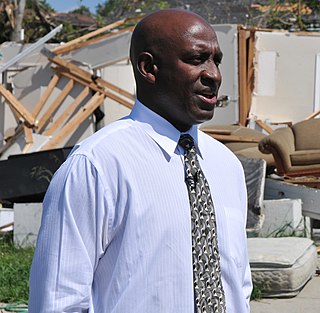
Joe Stanier Cribbs is an American former professional football player who was a running back in the National Football League (NFL) and United States Football League (USFL). He played college football at Auburn University along with future NFL backs William Andrews and James Brooks. He began his professional career in 1980 with the Buffalo Bills.

Antonio Michael Freeman is an American former professional football player who was a wide receiver in the National Football League (NFL), most notably for the Green Bay Packers. He attended the Baltimore Polytechnic Institute and Virginia Tech.

Gary C. Clark is an American former professional football player who was a wide receiver in the National Football League (NFL) for the Washington Redskins (1985–92), Phoenix/Arizona Cardinals (1993–94), and Miami Dolphins (1995).
Philip Joseph McConkey is a former American football wide receiver who played for the New York Giants (1984–1988), Green Bay Packers (1986), Phoenix Cardinals (1989), and San Diego Chargers (1989) of the National Football League.
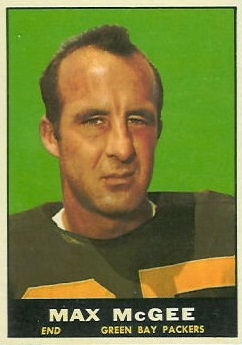
William Max McGee was an American professional football player who was an end and punter for the Green Bay Packers of the National Football League (NFL) from 1954 to 1967. He is best known for his seven receptions for 138 yards and two touchdowns, scoring the first touchdown, in the first Super Bowl.
Kelvin Brian Martin is an American former professional football player who was a wide receiver in the National Football League (NFL). He was selected by the Dallas Cowboys in the fourth round of the 1987 NFL Draft. He won Super Bowl XXVII with the Cowboys against the Buffalo Bills, giving him his only Super Bowl title. He played college football for the Boston College Eagles before playing ten seasons in the NFL from 1987 to 1996 for the Cowboys, Seattle Seahawks, and Philadelphia Eagles.
Early Joseph Doucet III is an American former professional football player who was a wide receiver in the National Football League (NFL). He was selected by the Arizona Cardinals in the third round of the 2008 NFL draft. He played college football for the LSU Tigers.
The 1991 Buffalo Bills season was the 32nd season and 22nd in the National Football League (NFL). The Buffalo Bills entered the season as defending AFC champions, having lost Super Bowl XXV to the New York Giants. They finished the National Football League's 1991 season with a record of 13 wins and 3 losses, the same record as their previous season, and finished first in the AFC East division. The Bills qualified for their second Super Bowl appearance but lost to the Washington Redskins, 37-24.
References
- ↑ Riggs, Randy (September 21, 1985). "Davis looks like a No. 1 in NFL draft". Austin American-Statesman . Retrieved May 23, 2019– via Newspapers.com.
- ↑ "'Red Grange Rule' stops Davis' entry". Latrobe Bulletin. AP. October 12, 1985. Retrieved May 23, 2019– via Newspapers.com.
- ↑ "Davis' agent wants special NFL draft". Lincoln Journal Star . October 9, 1985. Retrieved May 23, 2019– via Newspapers.com.
- ↑ "NFL Turns Down Kenneth Davis". Los Angeles Times . October 12, 1985. Retrieved May 23, 2019.
- ↑ "TCU's Davis drops lawsuit against NFL". The Salina Journal . AP. October 18, 1985. Retrieved May 23, 2019– via Newspapers.com.
- ↑ Mayers, Jeff (April 30, 1986). "Packers opt for offensive backfield help in draft". Chippewa Herald-Telegram. Retrieved May 23, 2019– via Newspapers.com.
- ↑ "1986 NFL Draft Listing". Pro-Football-Reference.com. Retrieved 2023-10-02.
- ↑ The Four Falls Of Buffalo
- ↑ "Bills and Eagles Turn Mountains Into Molehill; Buffalo Erases 32-Point Deficit". New York Times. January 4, 1993. Retrieved July 12, 2016.